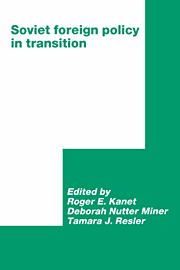Book contents
- Frontmatter
- Contents
- List of tables
- List of contributors
- Preface
- Introduction
- Part I The Soviet Union and the international political system
- 1 Soviet reform in international perspective
- Part II The Soviet Union and Europe
- Part III The Soviet Union and the developing world: global trends
- Part IV The Soviet Union and the developing world: regional and country case studies
- Part V Conclusion
- Index
1 - Soviet reform in international perspective
Published online by Cambridge University Press: 05 February 2012
- Frontmatter
- Contents
- List of tables
- List of contributors
- Preface
- Introduction
- Part I The Soviet Union and the international political system
- 1 Soviet reform in international perspective
- Part II The Soviet Union and Europe
- Part III The Soviet Union and the developing world: global trends
- Part IV The Soviet Union and the developing world: regional and country case studies
- Part V Conclusion
- Index
Summary
The extraordinary changes in foreign and domestic policy initiated by the Soviet Union in the past six years under Mikhail Gorbachev have left all but a very few statesmen and scholars in the West perplexed and unsure of the foundation of their assumptions about policy toward that great half-Western/half-Eastern giant. The years since the death of Chernenko have been filled with contradictory trends, as the forces of conservatism and reform have engaged in a competition with one another. The events in the USSR have been both unprecedented and deeply rooted in the Russian and Soviet past – unprecedented because of the depth and abruptness of the turnaround in both domestic and international affairs, and deeply rooted in the recurrent problems with which the Russian and Soviet leaderships have been forced to deal since the advent of Imperial Russia under Peter the Great.
Because the dramatic shifts in the foreign policy of the USSR have had a direct and critical impact on the foreign policy of the United States, as did the hostility between the two countries which preceded these shifts, it has been the job of scholars since 1985 to probe carefully into the origins, goals, and future of the new political thinking about international relations in the Soviet Union and the foreign policy based on it. Three interrelated sets of questions cluster around these issues at this critical juncture in Soviet history, as Mikhail Gorbachev faces diminishing support for his reforms and appears to be moving toward the right in an effort to retain power.
- Type
- Chapter
- Information
- Soviet Foreign Policy in Transition , pp. 9 - 28Publisher: Cambridge University PressPrint publication year: 1992

